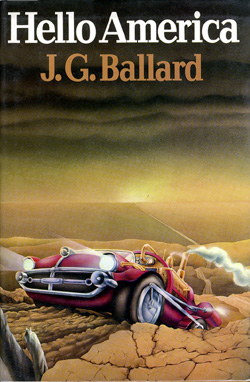
Hello America
J. G. Ballard
224 pages
published in 1981
I must’ve last read this sometime in the late eighties, back when I was dependent on my local library for my science fiction and fantasy. Said library had a rule that adult fiction could only be borrowed if you were at least fourteen years old; it also had a rule that you could only borrow four fiction books at a time. I however had found a hack for both rules: foreign language novels didn’t count for either. Which meant that once I could read English, I started reading every English language sci-fi book the library had, including this one. Not sure I finished it at the time, but I was reminded of it through Phil’s review, where he characterises it as “a minor Ballard” and going “completely off the boil” halfway through. That picked my interest enough to want to reread it and you know, he wasn’t wrong. In fact, I would go further and argue it never really got going as a story. There’s little of Ballard’s normal inventiveness or imagery here and it feels tired from the start. It doesn’t help that it was dated even at the time of publication by having Jerry Brown as the last president of the United States…
The core idea of the book, that America was abandoned rather than destroyed, is interesting. The oil crisis of the seventies here continued unabated into the 1980s and 1990s, leading to a de-industrialisation of the USA, with people migrating back to Europe and Asia not long after. By the turn of the millennium America is all but abandoned, a few decades later even the pretense of an American government in exile is also given up. The energy crisis is handled better in the old world, where giantic environmental engineering projects damn the Bering Strait to provide farm land in the Arctic circle, but condemning the American east coast to becoming a desert while the west becomes a jungle. All this is explained in chapter seven of the novel rather than more organically, in one big infodump. It’s a very seventies sort of apocalypse but it also reminds me of some of the paranoid rightwing fantasies of the eighties were America is either betrayed or given up on, without ever being explicitly conquered or destroyed, the fear that the world could continue on even without it. Ballard’s version of course only works if you don’t look at it too hard, which I feel goes for most of Hello America.
The story itself starts roughly a century after America was abandoned, when an expedition from Europe onboard the steamship Apollo (of course) sets foot on American soil for the first time in decades. They’re there to determine the cuase of the radiation leaking out from the continent. Decades old nuclear reactors may be leaking, as may some nuclear weapon storages, but it also looks suspiciously like an actual nuclear detonation. The handpicked crew of teh Apollo needs to answer this question, but Wayne, our protagonist isn’t one of them, as he stowed away, keen to visit the country his ancestors came from and his father disappeared in. Wayne is not, to be honest, a very active protagonist, mostly moved by what’s happening around him, rather than initiating his own actions. Which is not a problem as long as the expedition is on the move, but does mean, as Phil noted, that the second half of the book is much weakened when they reach Las Vegas and just stay there as things happen all around him.
The image of the United States Ballard presents in Hello America is very much rooted in 1950s & 60s pop culture: Marilyn Monroe, John Wayne, the Kennedies, “Indian” tribes modeled after Chicago gangsters or stereotypical Divorcees, with the Executives tribe members all having brand names like Heinz or Xerox, etc. The villain of the piece is even called president Manson. Even for 1981 this seems a bit much. The first half of the book, with the expediotion trecking through an endless desert following the ancient highways, from motel oasis to motel oasis has almost an overdose of what you could call stereotypical Ballardian imagery: empty swimming pools, cracked concrete et all. The second half in Vegas, doubles down on the kitsch, with a musical performance by a small army of robot replicas of the various US presidents.
In the end, this was a failure. Entertaining enough on a chapter by chapter basis, it failed to form a coherent whole and its momentum completely disappeared in its second half, which indeed took me twice as long to read as the first. It just became a chore to finish, something you shouldn’t be able to say of any Ballard novel.
No Comments